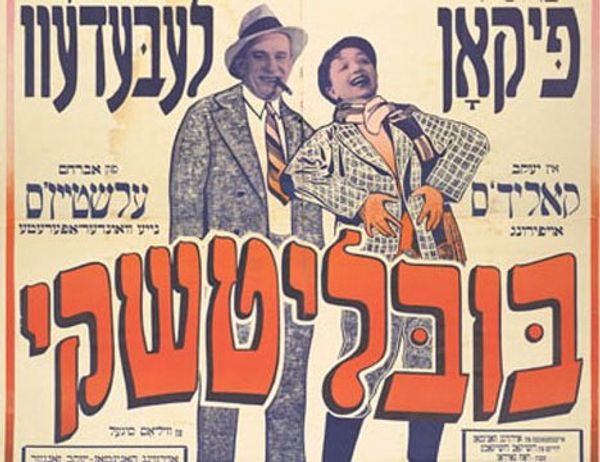
We all know a few Yiddish phrases — Oy vey, nosh, klutz — but now there’s a new way to truly expand your knowledge of the language: Duolingo. While the popular language-learning website and app are known for teaching Spanish, English, French, and other widely used languages, it will be introducing Yiddish as its 40th language. Their free Yiddish course, which has been in the works for about five years, launched on April 6.
Whether you decide to pick up the course or not, we’re bringing you 18 essential Yiddish words and phrases everyone should know. (Also, if love is in the air, check out our 10 ridiculous Yiddish pick-up lines.)
Read more: Why is Yiddish making a comeback?
Oy Vey
Oy vey is an expression of dismay or woe. It’s often abbreviated to just “oy” or elongated to “oy vey iz mir.” A similar phrase is “oy gevalt,” which has a similar meaning, but directly translates to “oh, violence!” and can be used as a cry for help.
A Yiddisher Kop
A Yiddishe Kop directly translates to “a Jewish head,” and can be used to refer to a smart person. For example “My husband is a Yiddishe Kop!”
Balaboosta
Balaboosta is a term of endearment which literally means “perfect homemaker.” Einat Admony, who wrote the Cookbook “Balaboosta,” has given the term her own definition. To her, Balaboosta means “someone who loves to bring family together by cooking and caring for them,” she says.
Nosh
Nosh means to snack or nibble. Although it is used in colloquial English, the word comes from the Yiddish “nashn.” It can also be used to describe a light meal or any kind of food. For example, “let’s have a nosh before we leave the house.”
Kvetch
Kvetch is the Yiddish term for “to complain” or “to whine.” A mother might say to her children “stop kvetching!”
Schlep
To Schlep is to drag or lug something around, often with difficulty. For example, “Oy, we moved to the wrong part of town. It’s such a schlep to get to synagogue.”
Mentch
Traditionally in Yiddish, a Mensch was a good person. Nowadays, Mensch has adopted the meaning of someone who is especially good, a “stand up guy,” or a person with high moral integrity.
Tachlis
When someone is speaking Tachlis they are being to the point. “Don’t sugarcoat it, tachlis, tell me what happened.”
Klutz
A Klutz is a very clumsy person — someone who is consistently falling or dropping things.
Plotz
The verb plotz means to burst, shatter, crack or explode. In English, it’s commonly used to describe a person who is figuratively bursting with intensity or emotion. For example, “I just finished a marathon, I could just plotz (collapse)” You could also be plotzing from laughter or to share big news.
Shmooze
To schmooze is to chat or make small talk — to shoot the breeze. At certain functions, schmoozing might be done in order to network or impress someone.
Yenta
Yenta or Yente refers to a woman who is a gossip or busybody. Originally, this was a name parents gave to their daughters meaning, as it was thought to be derived from the Italian word for gentle, but later developed a different meaning. For example, the matchmaker in “Fiddler on the Roof” was named Yente, and she was definitely known for meddling.
Shande
A Shande in Yiddish is a scandal, embarrassment, or something extremely shameful. A gossip column could be shanda-ridden. “Did you hear what he did? What a Shande.”
Schtick
A Schtick is an entertainer’s bit, routine, or gimmick. Generally, it’s a style of performance associated with a specific person, but it can also be a person’s signature behaviour, unique talent or interest. “I know I talk too loud, it’s my schtick.”
Chutzpah
When a person has Chutzpah, they have extreme self-confidence, boldness, gall or audacity. “It took real Chutzpah for her to go straight to the CEO to ask for a job.”
Meshuggeneh
Meshuggeneh directly translates to crazy. If someone or something is meshuggeneh they are crazy, ridiculous or insane. “He thinks he can speak to his own mother like that? He is Meshuggeneh!” A related word is mishegas which means craziness.
Shmatte
A Schmatte is a rag or an old or worn-out garment. Your mom might say to you, “you’re going out of the house wearing that Schmatte?”
Bubbe and Zeide
This is a must-know Yiddish duo. Bubbe and Zeide mean Grandmother and Grandfather. They are used to-date as affectionate terms.
Now that you know a few words, why don’t you check out these over the top Yiddish curses?
Check out this adorable video of the elderly residents at the Los Angeles Jewish Home explaining the various meanings of Yiddish words.
Originally Published Dec 26, 2022 10:58AM EST
